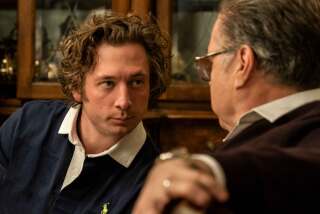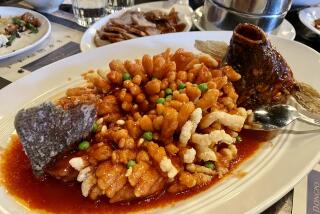Bigger fish to fry in the New World
- Share via
“FISH on Friday” chronicles and celebrates the years of human effort and ingenuity it took to bring food, lots of it, from the sea to men’s and women’s tables.
Author Brian Fagan even ends on a triumphant note: “It was not the sudden inspiration of famous names that brought Europeans to North America -- not Columbus or Cabot or the settlers at Plymouth Rock -- but the thousand-year journey in pursuit of fish.”
But there is a cast of melancholy over the book because Fagan doesn’t venture into the present day, when too many fishermen are chasing too few fish. A swelling, hungry and technologically advanced world population is draining the seas of fish -- in some places faster than they can replace themselves.
The great schools of cod off Newfoundland so lovingly described here were recently placed off-limits for fishing by the Canadian government for their reproductive health. So Fagan tells us how it all began without revealing how it may be ending.
That said, “Fish on Friday” is in its way a model of what for nearly 100 years has been called “the new history” -- one that tells not the story of kings, presidents and great men but that of life as it is lived by the mass of people in their occupations, their preoccupations, their daily struggles for food, shelter and safety. It is a branch of history founded most notably by Karl Marx, who sought to discern the deep economic and social impulses that underlie political developments in the story of mankind.
He paints a finely drawn picture, embellished with eye-catching nuggets of fact and shrewd adventures in speculation. The overwhelming impression you get from this book, as from others that have explored the last few thousand years, is how rapidly humans made new tools and developed new techniques that extended their mastery over the Earth.
As the Age of Exploration was ushered in by Christopher Columbus and John Cabot in the 15th century, a vast industrial-scale fishing industry was already well established in the western and northern Atlantic Ocean. It had graduated from the smaller-scale harvesting of herring to the great takes of cod from the deeper ocean. The herring was impressive nevertheless; by the start of the 14th century 30 million salted herring were arriving in Paris by barge every year. That was before the magnificent cod had earned the name “the beef of the sea” and had begun to feed millions of Europeans.
Fagan, a retired historian at UC Santa Barbara, who has written other agreeable histories -- “The Little Ice Age: How Climate Made History, 1300-1850” and “The Long Summer: How Climate Changed Civilization” -- traces the European hunger for fish to the early Christians, who believed that meat fed the human sex drive and fish was a much more decorous way of getting protein. Whether it was a pinch in the supply of meat or a restriction in demand that caused it, by the 9th century about half of all days of the year were holy days, that is, meatless days. These numbers may -- or may not -- explain the great popularity of eels for food in medieval Europe.
There is a winning quality in Fagan’s writing as he takes you through various styles of shipbuilding, the proper construction of fishponds and how to clean and salt a herring. He offers recipes, such as a rather ordinary Newfoundland cod cake and the more exotic Tart de Brymlent, a Lenten fish pie he calls “wonderful.” (It includes pears, apples, prunes and dates.)
A seaman himself, Fagan gives us some nice descriptions of the art: “Anyone who sails the northern French coast must acquire an intimate knowledge of tides and tidal overfalls, sandbanks and narrow channels beneath rocky outcrops.... I remember once anchoring off the entrance to Brittany’s Morlaix River in a thick fog with nine meters of water under our keel at low tide, waiting for the visibility to improve. ... Like the Labrador and Newfoundland coasts, Brittany and Normandy are not for the timid,” he writes.
The details Fagan gives of the developing fish industry may be a bit more than some readers care to know, but these details reveal cunning man at his cleverest, always looking for ways, no matter how small, to make his life easier and more productive.
Anthony Day is a former editor of The Times’ editorial pages.
More to Read
Sign up for The Wild
We’ll help you find the best places to hike, bike and run, as well as the perfect silent spots for meditation and yoga.
You may occasionally receive promotional content from the Los Angeles Times.






